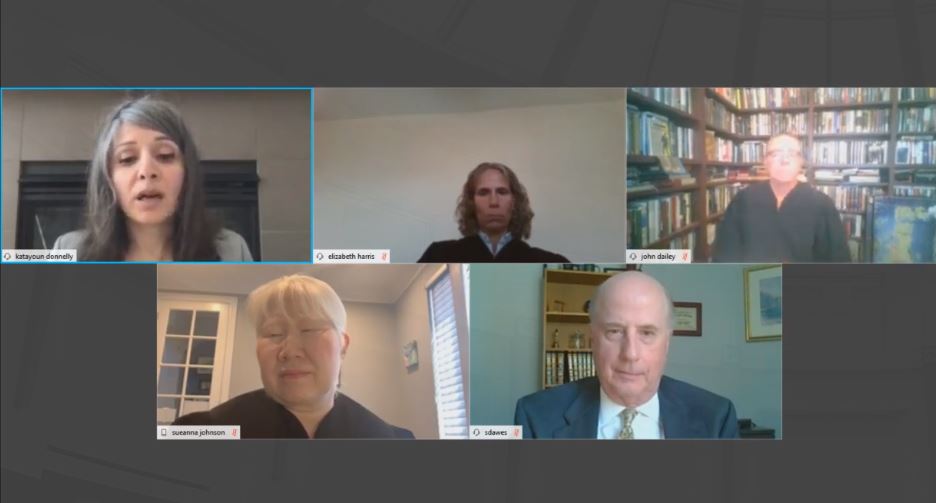By Jeffrey A. Roberts
CFOIC Executive Director
The Colorado Court of Appeals heard arguments via web conference Tuesday in a case that focuses on what city councils and other government boards must tell the public prior to convening a closed-door meeting.
Since 2001, the Colorado Open Meetings Law has required state and local public bodies to announce the topic of each executive session “in as much detail as possible without compromising the purpose for which the executive session is authorized.”

But three years ago, a judge in Eagle County called that provision just a “technical” aspect of the Sunshine Law in ruling that the Basalt town council was not in violation when it failed to describe the subject matter of four executive sessions held to get legal advice and to discuss a personnel matter.
Representing plaintiff Theodore Guy before a three-judge appellate panel, attorney Katayoun Donnelly said the open meetings law requires strict compliance. “If the executive sessions are not properly convened, the transcripts are part of the public record,” she told the judges.
The Basalt town council had a practice of “not providing any information” before going into executive session, Donnelly added. “But since this lawsuit, and as a result of this lawsuit, the town has now started providing the information.”
The purpose of mandating topic specificity is to provide community members with something more than a vague idea of why their elected officials are excluding them from a meeting. It gives the public a way to police whether public bodies might be straying from the law, and it gives public officials a framework for avoiding confidential discussions of unauthorized topics.
Noting the law says an executive session topic must be announced “in as much detail as possible,” Court of Appeals Judge John Dailey asked, “How is that satisfied when there is no detail given?”
Steven Dawes, an attorney for the Basalt town council, responded that attorney-client privilege makes it “impossible for the town to have made any further statement with regard to the nature or purposes of the executive session.”
“If you discuss in some additional detail the nature of the attorney-client privilege, you end up risking waiving the attorney-client privilege,” he argued.
But Donnelly said attorneys routinely are asked to prepare privilege logs that describe confidential matters in such a way that “both the judge and opposing counsel can determine if privilege is properly asserted. That’s all that was requested in this case, to provide a description,” she said.
Dailey noted that the town council has since listed Guy’s appeal of his lawsuit as the topic of certain executive sessions held to receive legal advice. And appellate Judge Elizabeth Harris asked how “stating the subject of discussions between an attorney and his or her client waives the privilege.”
Dawes also contended the town council could not publicly name the subject of an executive session on a personnel matter – now-former town manager Mike Scanlon – because doing so would have violated the terms of his employment contract. “Because the contract says, we the town may not reveal anything about his performance” or any discussions about him in executive session, he told the judges.
But naming Scanlon as the topic of a personnel-related executive session would not have revealed “anything about his performance or anything else,” Harris said. “It’s just saying it’s a fact that he is a city manager with a contract.”
Court of Appeals Judge Sueanna Johnson noted that Scanlon’s employment contract was subject to public disclosure under the Colorado Open Records Act. “And so in one realm, Mr. Guy could go get his employment contract,” she said. “But in an open meeting we can’t even know that Mr. Scanlon’s employment contract may be up for discussion as a personnel matter?”
Dawes said the issue isn’t whether Scanlon’s employment contract was up for discussion. “The issue is whether his performance could be discussed.”
But Johnson said merely naming Scanlon as the subject of the executive session “for purposes of giving notice to the public … says nothing about what his performance is – if it’s good, if it’s bad.”
“The public notice is not just for Mr. Scanlon to know that he’s going to be talked about at this meeting,” Johnson said. “The public generally may want to know there’s going to be a topic about Mr. Scanlon. And whether they get to be a participant because Mr. Scanlon wants an executive session is a separate issue.”
Dailey ended the hearing on WebEx by saying the appellate panel would issue an opinion “as soon as we can decide it.”
Follow the Colorado Freedom of Information Coalition on Twitter @CoFOIC. Like CFOIC’s Facebook page. Do you appreciate the information and resources provided by CFOIC? Please consider making a tax-deductible donation.




